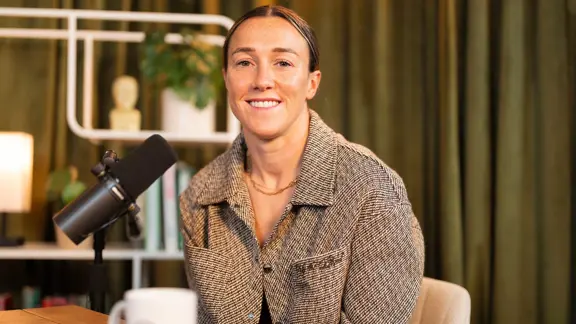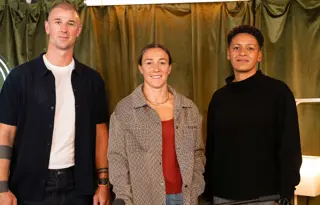News
Footballers Unfiltered: Lucy Bronze on player advocacy and growth of women's game

- Lucy Bronze was the latest guest on FIFPRO’s Footballers Unfiltered, hosted by former Manchester City and England goalkeeper Joe Hart
- The series enables current and former footballers to have open conversations about the hidden side of the profession
- England defender Bronze reflects on the rapid professionalisation of women’s football, what more still needs to be done at the elite level, and the importance of player advocacy
Lucy Bronze is one of the most decorated players in the current game. After winning a second UEFA EURO title with England in July – adding to her vast collection of club winners' medals that includes five Champions Leagues and nine top flight league titles to name but a few – it would be an understatement to say Bronze knows what it takes to win.
It is also fair to say Bronze, soon to turn 34, has a drive and passion for success that remains strong as ever, especially when it comes to pulling on an England jersey.
"It was my dream to win for England and then to do it back-to-back in that same competition was insane," Bronze, reflecting on England’s two EURO titles on the trot, told FIFPRO’s Footballers Unfiltered Podcast. "If I'd thought about that five years ago, I'd have said that's crazy. It’s so hard for any team to do, so to have done it with England is amazing."
A crowd of 87,000 at Wembley watched England’s first Women’s EURO victory in 2022. Their second EURO triumph came during a tournament in Switzerland that broke aggregate attendance records. That level of grandeur is a far cry from Bronze’s beginnings when a teenager at Sunderland. "We made the FA Cup final (in 2009) and we couldn't afford the bus."
'I didn't earn enough to get taxed'
Bronze was 21 when she signed her first professional contract at Liverpool in 2014, four years before the Women’s Super League in England became full-time across the board.
"I got £6,000 for the year. That was my professional contract three years in, plus expenses. I claimed more on expenses than I got paid. I didn't earn enough to get taxed.
"I was quite fortunate because I say that my first two years when it was professional, I was at university, so I was studying and getting my degree. I never had the dream that professional football was going to be my job. I still had a part-time job in Domino's [Pizza]."
More professional domestic leagues across Europe means more full-time opportunities for women’s footballers nowadays – but preparing financially for life after football remains a necessity for players.
"I got asked about women's footballers being able to retire, and I was like ‘well, 99 percent won't be able to retire off of what they made’. It's not to say that they should be able to, it's just the way it is."
Bronze was joined on Footballers Unfiltered with former WSL player Victoria Williams, who is now a Player Services Executive at the Professional Footballers Association. One of the PFA’s key priorities is helping players prepare for life after football – whether through further education or equipping players with skills to succeed off the pitch.
"The reality is when you hit your mid-30s and you decide to stop playing, what you've earned is probably not going to be enough," says Williams. "Even if you feel like you're semi prepared for it, it's still a difficult period stepping that out of the bubble into what we call the real world."

'I am someone who puts themselves forward for anything'
While significant strides have been made when it comes to the professionalisation of women’s football at the elite level, there is still some way to go. Though she has played for some of the biggest clubs including Lyon, Barcelona and current side Chelsea, Bronze feels improvements can still be made.
"I've played for the best women's teams in the world and they're not as amazing in the background as you think. They're all missing something. But that's just the women's game and where it's at. Maybe we don't share that enough about vulnerabilities or weaknesses because nobody wants to in the real world."
Bronze is able to put her experience to good use as a member of FIFPRO’s Global Player Council, a platform for men’s and women’s professional footballers that puts them at the heart of decision-making in international football.
The council assists FIFPRO and its national player associations by representing footballers in negotiations about global issues that directly affect them including the international match calendar, employment standards, the use of personal data and social media abuse.
"I am someone who puts themselves forward for anything," says Bronze. "I've educated myself on a lot of things and I've been involved in FIFPRO, player boards, PFA player boards. I've been involved in all England contract talks, so my knowledge keeps growing, which then puts me in more situations.
"When we talk about the women's game and the place it's in, sometimes people making decisions don’t have those lived experiences; I think I'm one of the few players who've experienced so many different things as well as playing at such a high level that I know people will listen to me. I've got a responsibility to actually share that because I've been given the platform and stage that so many players haven't been given.
"Being on a player board gives you the chance to share your experiences, listen to other people from different places as well and make a difference."
While committed to that off-pitch work, Bronze’s core focus is on her playing career. And there is still one trophy that has escaped her grasp. "The only thing I don’t have is the World Cup."
Bronze continues: "Winning something for England has always been my goal and winning the Euros is amazing, but there is nothing better than the World Cup. I've played in three World Cups; I finished fourth, third and second.
"I want to make it to the next World Cup. I'm obviously not the youngest player. I'll be pushing myself to get there, and I've been fortunate enough to go to seven major tournaments for England, why not make it another one?"
